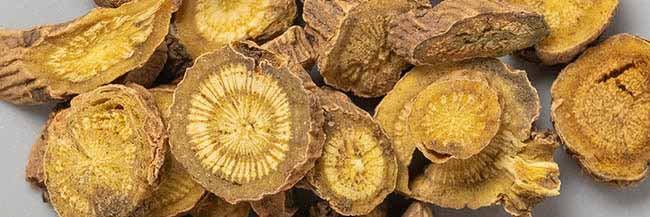What is Chinese Skullcap?
Chinese skullcap is a perennial herb native to China, Korea, Mongolia, Russia, and Siberia. This mint family (Lamiaceae) member has vibrant green leaves and purple flowers, growing up to one foot in height.
Chinese skullcap enjoys sandy and rocky habitats near water and can thrive at sea level and up to 6,000 feet in altitude. It can commonly be found growing near waterways like creeks or alongside seashores.1
Beyond its beautiful appearance and convenient use as a drought and cold-tolerant garden plant, Chinese skullcap offers medicinal benefits that have been known and utilized for thousands of years.2

Baicalin, a phytochemical present in the root of Chinese skullcap, has antiviral, antibacterial, anti-tumor, and antioxidant properties.3
Modern research continues to confirm its beneficial medicinal actions, with many studies focused on its antimicrobial, immune-supportive, liver-protective, and nerve-protective activity.3
Benefits of Chinese Skullcap and How It Works
Antimicrobial Benefits
When microbes like viruses, bacteria, and fungi get out of hand, they can cause oxidative stress and a wide spectrum of cellular damage that can progress disease and worsen symptoms in their host.
Chinese skullcap is a proven antimicrobial herb offering potent antiviral activity against a range of different viruses, as well as some antibacterial and antifungal properties.
Most of Chinese skullcap’s antimicrobial actions happen through the herb’s ability to stimulate the immune system, reduce inflammation, and protect cells.
Its antiviral mechanisms include increasing interferon, a substance produced by the body to help fight infections and tumors, modulating immunological and inflammatory pathways, and inhibiting cell death.3
Chinese skullcap has been found to have antiviral activity against reactivated Epstein-Barr virus, herpes viruses in general, and SARS-CoV-2 that causes COVID-19.1,3
In vitro studies show that Chinese skullcap has an antibacterial effect against H. pylori, a bacteria that can cause stomach infections, and Staphylococcus aureus, a bacteria that can cause antibiotic-resistant infections.4,5
Immune Health
Chinese skullcap helps to balance the immune system. This means it calms overactive portions of the immune system associated with destructive inflammation and boosts the immune system’s ability to fight off infections.6,7
When used consistently, Chinese skullcap’s ability to downregulate excessive immune responses can be helpful for allergies and autoimmune conditions, which are both marked by an overactive immune system.
In an animal study, Chinese skullcap extract reduced inflammatory allergic response in mice by decreasing mast cell activity and histamine release and regulating inflammation.8
Multiple studies have demonstrated that Chinese skullcap extract can fight a broad range of cancer cells. These effects have been tied to the herb’s ability to fight oxidative stress and weaken inflammatory pathways.9
An in vitro study from 2002 showed that Chinese skullcap strongly inhibited the growth of some of the most common human cancer cells, including skin, breast, liver, prostate, and colon. The authors suggest that this may be due to its ability to inhibit inflammatory COX-2 activity.7
In an animal study, Chinese skullcap extract inhibited tumor growth, the mechanism of which was thought to be due to the herb’s immune and antioxidant effects.11

Liver Protection
Chinese skullcap is an ingredient in several traditional Chinese medicine formulas used for liver conditions like hepatitis and fibrosis. Today, modern research confirms these uses.9,12
In an animal study, Chinese skullcap extract had a liver-protective effect against alcohol-induced liver injury in mice. Mice treated with the extract had more glutathione activity and less liver swelling and inflammation. Although more research is needed, the authors believe this effect is due to the herb’s ability to regulate oxidative stress and programmed cell death, which are important factors in regulating liver health.12
Baicalin, a biologically active compound in Chinese skullcap, has potential protective effects against liver injury caused by drugs and environmental toxins.13 In acetaminophen-treated mice, it significantly reduced oxidative stress and inflammation.14
Chinese-skullcap’s antiviral actions have also shown promise in virus-related liver disorders like hepatitis.13
Nerve Health
Recent scientific research has started to focus on Chinese skullcap’s capacity to protect the brain and nervous system. Both in vitro and in vivo studies have demonstrated these neuroprotective effects.13,15
In vitro studies show that baicalin, a flavonoid present in Chinese skullcap, can protect nerve cells from oxidative stress and can inhibit nerve cell death, which are common features of neurodegenerative diseases like Alzheimer’s and Parkinson’s.15
In addition to these anti-inflammatory, antioxidant, and antiapoptotic effects, Chinese skullcap can regulate glutamate activity, an excitatory neurotransmitter that, in excess, can damage brain cells.15
Chinese skullcap can also help to improve memory. An animal study found the extract to improve poor memory through its antioxidant, anti-inflammatory, and immune-modulating actions.16
History & Traditional Use
Chinese skullcap has been used as a medicinal plant in China for thousands of years. One of the 50 fundamental herbs used in traditional Chinese medicine (TCM), it was originally documented in Shennong Bencao Jing, a Chinese book on agriculture and medicinal plants produced during the Eastern Han Dynasty of 25 CE-220 CE.9
Later, it appeared in Bencao Gangmu, one of the most authoritative books on TCM. In this text, first published in 1593, Chinese skullcap was reportedly used for diarrhea, hypertension, insomnia, inflammation, and respiratory infections. Its author, Li Shizhen, reported successfully using Chinese skullcap for a severe lung infection at 20 years old.9
In TCM, the root is used for many conditions, including hepatitis, viral infections, atherosclerosis, and ulcerative colitis.2
The leaves are sometimes used as a steamed vegetable, and the dried leaves are common as a tea.1
How to Use and Dosing
Chinese skullcap is most commonly taken as capsules or as a tincture.
The suggested dosage of a powdered root extract capsule is 400-1000 mg, two to three times daily. An extract standardized to at least 30% baicalin is preferred.
1-2 mL of Chinese skullcap tincture is generally taken up to 3x daily.
Note that American skullcap, Scutellaria lateriflora, does not offer the same antimicrobial properties and should not be substituted for that purpose.
To enhance Chinese skullcap’s antimicrobial effects, consider combining it with other antimicrobial herbs like andrographis, cat’s claw, garlic, and Japanese knotweed.
For immunomodulating benefits, it pairs well with adaptogenic herbs like cordyceps and ashwagandha, among others.
For added liver protection, Chinese skullcap combines well with turmeric, milk thistle, and reishi mushroom.
Interactions
Use caution if you are taking pharmaceuticals, as Chinese skullcap can possibly increase their impact.
Always check with your health care practitioner before use if you are taking medications. For more general education on potential interactions between herbs and medications, check out Dr. Bill Rawls’ article: Is it Safe to Take Herbs with My Medications?
Precautions & Side effects
Side effects are uncommon and are mostly gastrointestinal. Consult your health care practitioner if you are pregnant and interested in consuming Chinese skullcap.
Disclaimer: This information is intended only as general education and should not be substituted for professional medical advice. Any mentioned general dosage options, safety notices, or possible interactions with prescription drugs are for educational purposes only and must be considered in the context of each individual’s health situation and the quality and potency of the product being used. Use this information only as a reference in conjunction with the guidance of a qualified healthcare practitioner.




